Women’s soccer beats Rutgers 1-0 RIPTA offers free rides to low-income residents
BY PETER SWOPE SPORTS EDITORThe women’s soccer team (13-2-2, 5-0-1 Ivy League) beat No. 24 Rutgers University (13-5-2, 5-3-2 Big Ten) 1-0 Saturday in the first round of the NCAA Tournament in Piscataway, N.J.

A late goal from a header by forward Ava Seelenfreund ’23.5 broke a 0-0 tie in the 81st minute, allowing the Bears advance to the second round of the tournament where they will face the University of California, Irvine.
The result marks an improvement on Brown’s performance in the NCAA Tournament last year, in which the Bears suffered a heartbreaking firstround loss to St. John’s University. While that game remained scoreless until the Red Storm scored a 99th min ute game-ending goal in overtime, this year the Bears were able to prevail in a low-scoring contest and net a late goal
of their own.
“This win means a lot to this team,” Head Coach Kia McNeill said in a state ment to Brown Athletics. “I’ve said all season that this team can play with anyone in the country. I think we had a tremendous Ivy League run to make it here to the postseason.”
The victory “solidifies our place in the tournament as a serious competitor and builds our confidence for future rounds,” forward and midfielder Shey enne Allen ’23 wrote in a message to
UNIVERSITY NEWS
LGBTQ Center officially opens Stonewall House
tor Kelly Garrett can tell you, when she first began at Brown in 2004, the LGBTQ Center was little more than a single room.”
The Herald.
The last time Bruno advanced to the second round of the NCAA Tourna ment was in 2019 when the Bears fell to top-seeded Florida State University. Prior to 2019, Brown last advanced to the second round in 1994.
Taking on a struggling Scarlet Knights squad that had lost three straight games entering Saturday’s contest, the Bears wasted no time going
BY JACOB SMOLLEN SENIOR STAFF WRITERAt 7 a.m. last Sunday, a small line formed outside a side chapel at Mathewson Street United Meth odist Church in downtown Provi dence. Normally, lines at this hour would only be for food, as the church offers free breakfast each week for unhoused people. But this particular morning, those in line were also waiting for something else — a free bus pass.
Once inside the chapel, break fast-goers filled out white registration forms. After completing the final steps with a Rhode Island Public Transit Authority representative, a program worker took makeshift identification photos on a phone.


“I just started a job. I need to go to East Providence,” said Michael Di nagen, who had just received one of the passes. “It’ll save me a little bit of money. I live in a shelter (and) I’m trying to get out of there.”
RIPTA launched a new pilot pro gram Nov. 3 that will deliver 600 free bus passes for those who make less than 200% of the poverty threshold, according to a recent RIPTA press release. The passes will last for six months.
“The best defense is to orga nize. … Because of your work, 600 bus passes are going out to the un housed,” Mathewson Street Pastor Duane Clinker told those eating their Sunday breakfasts. Above him, a big white banner read: “We want free bus transportation for all unhoused people in R.I.”
Without the pilot program, in or der to receive a no-fare bus pass under RIPTA’s current rules, applicants must either have a qualifying disability or

ARTS & CULTURE
Questlove, Patel talk ‘Summer of Soul’
BY SOFIA BARNETT SENIOR STAFF WRITERThe LGBTQ Center held a grand opening Friday for the center’s new building, a dedicated space called “Stonewall House” located at 22 Be nevolent St.
The event included remarks from Director of the LGBTQ Center Caitlin O’Neill, President Christina Paxson P’19, Vice President for Campus Life Eric Estes and donors Katie and Brent Gledhill.
O’Neill kicked off the ceremony with opening remarks, detailing the growth of the LGBTQ Center and shar ing insight on how the new building would be used to support Brown’s LGBTQ student community.
“When I began at Brown in 2019, the LGBTQ Center was two rooms tucked away in the busy campus cen ter,” they said. “As our former direc
“And now, 18 years later after the center opened, we are blessed be yond measure to have moved from two rooms into a two story home,” O’Neill said.
O’Neill shared that those involved in the center’s relocation hope that the new space can be a place for stu dents to “study, relax, collaborate, work and attend (center) program ming all at the same time,” referenc ing the fact that the center has been limited in what it can do in its own space in the past.
“For years, we’ve needed to ask students who are studying or relaxing in the center to relocate so we can use the room,” they said. But “Stonewall House has room for everything.”
O’Neill thanked the Gledhills for allowing the center to have “an actual home.”
O’Neill also spoke about the im portance of carving out a safe and comfortable space on campus for
BY FINN KIRKPATRICK SENIOR STAFF WRITERAhmir “Questlove” Thompson and Joseph Patel, director and produc er respectively behind the Acade my Award-winning documentary “Summer of Soul,” visited campus on Saturday. In a double-header event hosted by the Watson Institute for International and Public Affairs, Questlove and Patel discussed their creative processes and the social rele vance behind the film. The event was sponsored by the John F. Kennedy Jr. Initiative for Documentary Film and Social Progress.
“Summer of Soul” chronicles the Harlem Culture Festival, which took place over six weeks during the sum mer of 1969 at Mount Morris Park. The film not only tells the story of the fes tival itself, but also paints a picture of the socio-cultural climate during the time the festival took place. The film intersperses footage of the concert —
featuring notable acts such as Stevie Wonder, Sly and the Family Stone and Nina Simone — with archival footage of historical events such as the assas sination of Martin Luther King Jr. and the Apollo 11 mission to the moon.
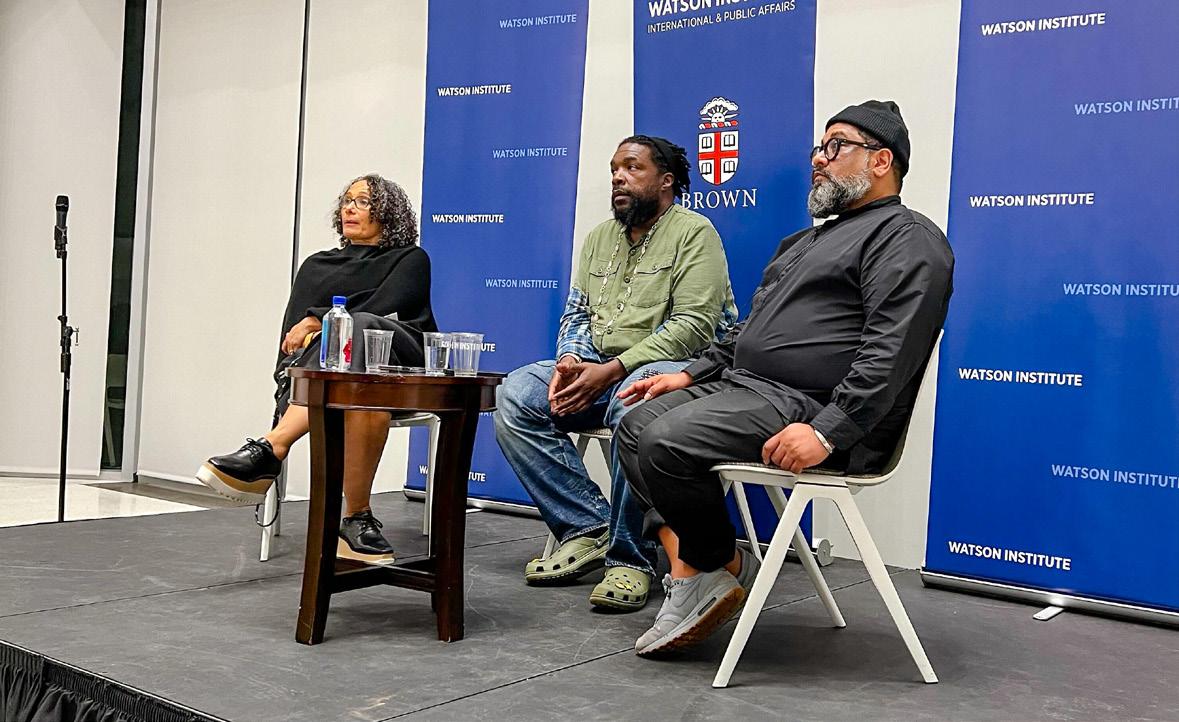
Randall Poster ’83, music supervisor of the film and a co-founder of the John F. Kennedy Jr. Initiative, moderated a small, informal discussion between Questlove, Patel and students. Poster started off the conversation by talking about his passion for the content of the film.
“The music in ‘Summer of Soul’ was so refreshing, substantive and enduring
in power,” Poster said. He added that the music at Woodstock, which took place during the same time and was far better known, has not stood the test of time to the same extent as the Harlem Culture Festival.
The archival footage used for the film totaled around 40 hours long and sat untouched for nearly 50 years before Questlove was approached to direct the documentary, Questlove said. Once he obtained all the footage, he had every TV in his house playing a loop of all the film so that he could become completely
Murielle Borst-Tarrant explores Indigeneity in one-woman show
Football team falls to Columbia 31-24 on
PresidentPaxson, donors speak at opening event Bears will face University of California, Irvine in second round of NCAA Tournament RIPTA
to distribute 600 free bus passes as part of pilot program to expand eligibility
Creators behind awardwinning film speak about creative process, historical preservationCOURTESY OF BROWN ATHLETICS Despite the teams’ strong offenses, the match remained 0-0 for the first 80 minutes with three saves from goalkeeper Bella Schopp ’26. FINN KIRKPATRICK / HERALD “Summer of Soul” drew from 40 hours of archival footage that had sat mostly untouched in the 50 years before Questlove began the project.
Sounds@Brown features handpicked student artists at November show
Student artists performed different genres of music in Leung Family Gallery
BY NATALIE VILLACRES SENIOR STAFF WRITERSounds@Brown hosted its second show of the semester in the Leung Family Gallery on Saturday. The hour-long event spotlighted singer-drummer Daiela Simon-Seay ’26, singer-song writer Arielle Martinez Cohen ’23.5 and the hip-hop collective NOTSO DIFFERENT.
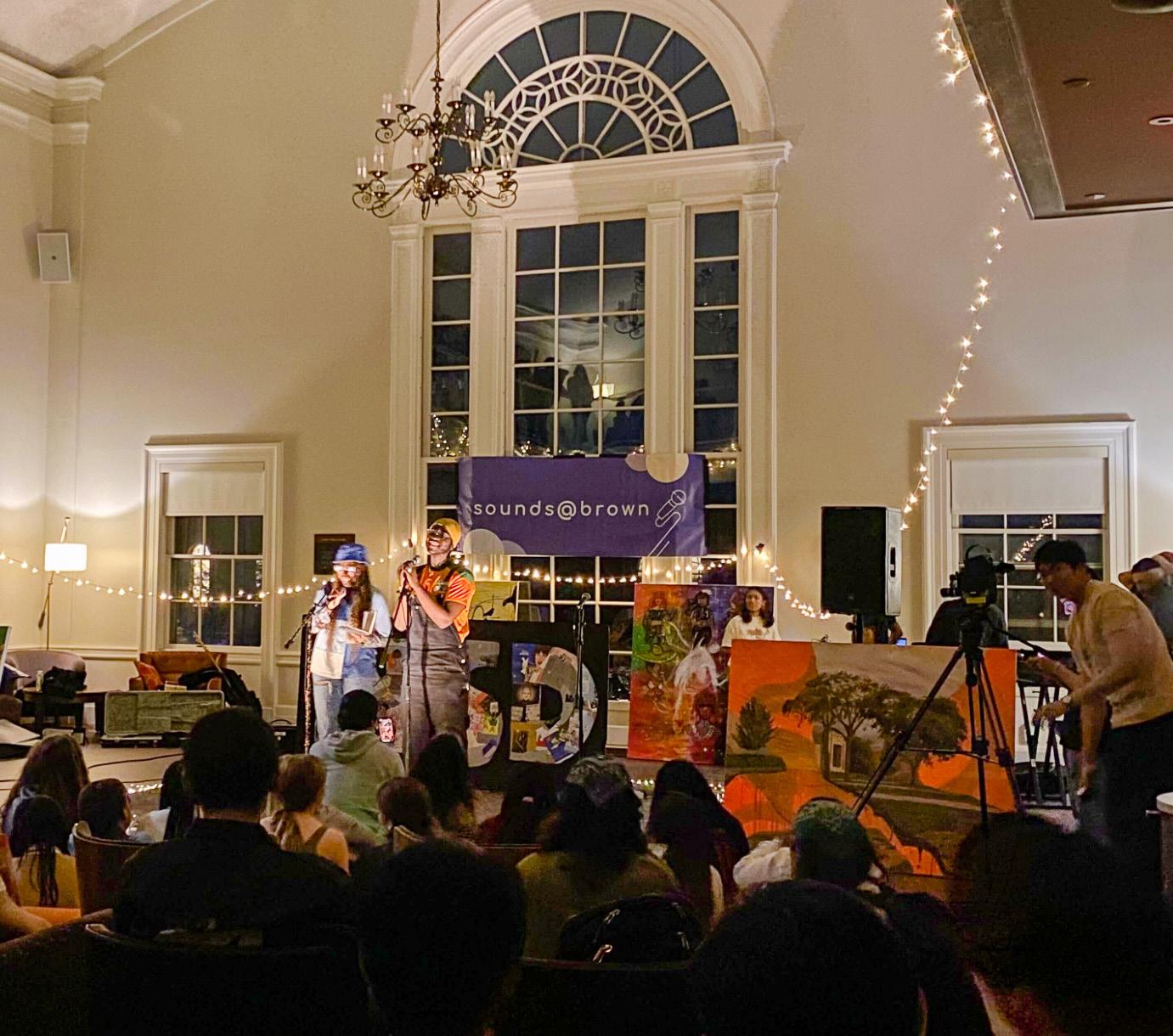
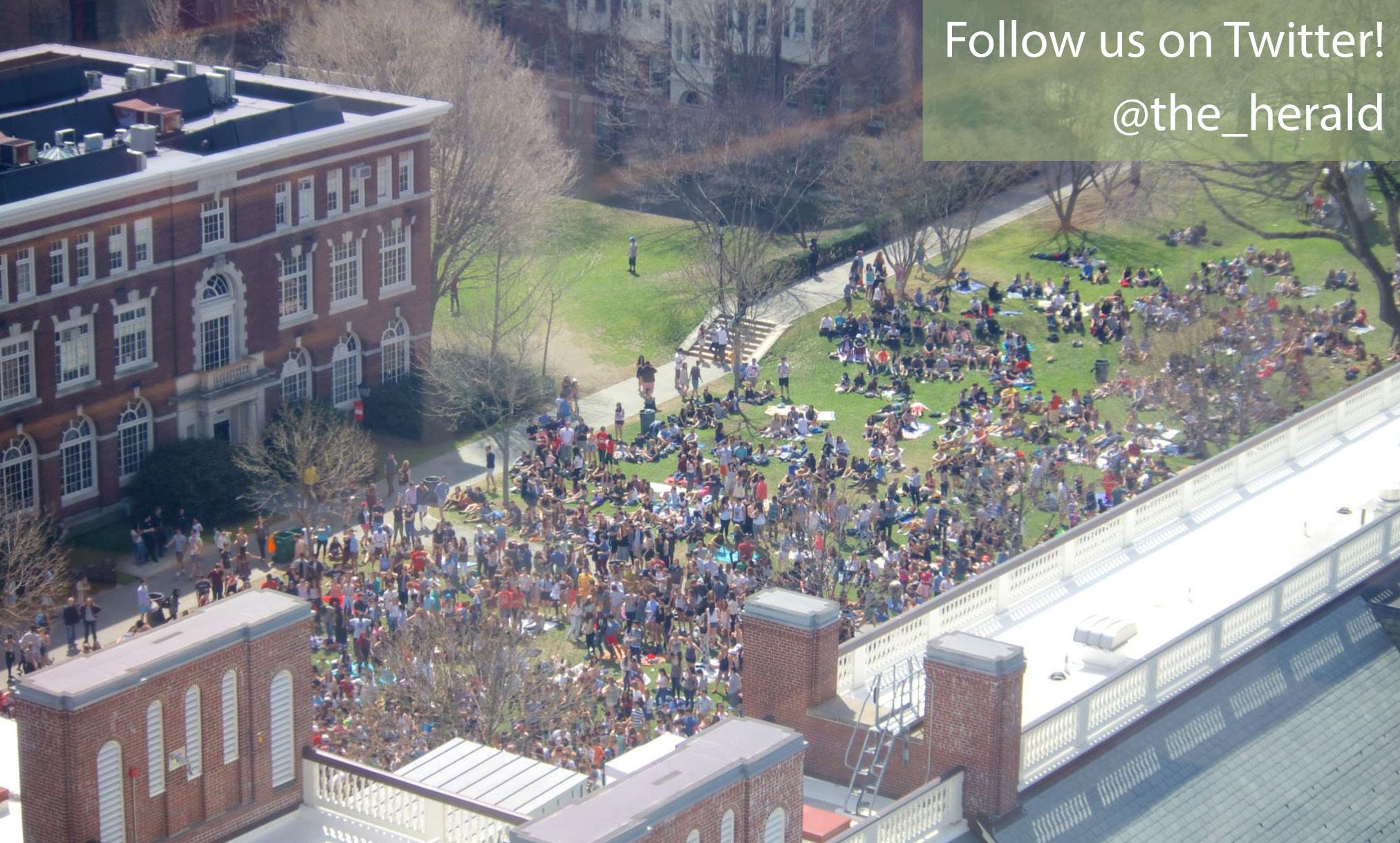
Sounds@Brown — a student-run organization that aims to showcase student artists and their work — centers on live performances and connection, cultivating artistic expression while fostering musical community across campus.
“We’ve been able to showcase so many people … and I feel like we’re kind of just one of the ways in which they can really get to show off their work and also have fun,” said Eric Ma ’25, a board member of Sounds@Brown. “It’s fun to have the Brown community come together and listen to something.”
Simon-Seay and her accompanying band kicked off Saturday’s show with an original piece titled “i’m not her,” which she released over a year ago. The performance featured Ian Hajra ’26 on the keys, guitarist Julien Deculus ’25, bass player J.D. Gorman ’26, drummer Lucas Lieberman ’25 and background vocalists Herald Senior Staff Writer Li nus Lawrence ’25, Makayla McPherson ’24 and Ria Panjwani ’23.5.
Chigo Manu ’26, one of Saturday’s attendees, was excited to see Daiela and other student artists perform live. He described the showcased groups as “phenomenal” and “engaging.”
“There was nothing that I felt was lacking. They hit every single point, every note … The energy was lit, it was
live. It was everything I wanted this Saturday,” said Manu.
Each performer featured through out the event was required to audition for the show. Ma added that Sounds@ Brown handpicked artists based on the event’s “vibes.”
“In this setting, … we didn’t want just singer-songwriters or just five-peo ple bands … we wanted to … mix it up. And that’s sort of what we did in this last show. We definitely tried to switch things up,” Ma said.
Cohen, the second vocalist featured during the event, expressed her grat itude in collaborating with Sounds@ Brown. She emphasized the crowd’s engaged energy and the overall “fun” experience. Cohen played a combina tion of covers and original pieces, end ing her performance with an untitled song that has yet to be released.
“I was supposed to perform at an other one of (Sounds@Brown’s) shows, but then I got COVID. So this was mak ing up for it, which I’m really happy I got to do,” Cohen said.
The event concluded with the hiphop collective NOTSODIFFERENT, featuring student artists Elliot Urgent ’24, Jordan Walendom ’23, Teni Ayeni ’23, Jordan Turman ’23, Jialang Zhou ’24, Jared Cetz ’24, and Jennora Blair ’24. The group performed a variety of works that ranged in musical diversity, while also showcasing their own visual art pieces during the set.
Jennora Blair ’24 was invited to perform at the event by the collective through her rap songwriting class, seiz ing the opportunity to experiment with her voice and dive into a new musical medium — she typically sings a capella with Shades of Brown. Blair said she hopes to work with Sounds@Brown again in the upcoming weeks, perform ing at future events alongside fellow artists.
“It feels very intimate, and I think that’s what I really loved about it, be cause it felt very communal,” Blair said.
“I felt like I was able to just sing my heart out to people and just have fun in a very non-pressured, communal space. I think Sounds@Brown does a really good job with that.”
According to Ma, the Sounds@ Brown team aimed to create a “cozy” environment in a “quirkier” venue, dec orating the Leung Gallery with fairy lights, handing out multi-colored finger beams and laying out blankets for a more welcoming, relaxed feel.
“We encouraged people to really feel comfortable and just focus on the music and focus on the people there, and just foster that really intimate sort of vibe
and community,” Ma said.
Attendee Mikai Spencer ’26 noted his appreciation for the intimate en vironment, adding that the interactive space allowed for audience members to connect with the groups while they per formed. The NOTSODIFFERENT collec tive encouraged attendees to snap their fingers and stomp their feet as artists performed. Similarly, Simon-Seay and Cohen welcomed audience members to sing along to their pieces.
San Kwon ’25, an attendee who ac companied a friend to the latter half of the show, was taken with the talent of the performers. “It was actually really
amazing. There are so many performers that I’ve never seen before,” Kwon said.
Ari Weingarten ’24, a first-time Sounds@Brown event attendee, said the show and the “inspired” artists showcased in the performances ex ceeded all of his expectations.
“Now that people are back together, (the music scene) is better than ever,” Weingarten said. “There’s so many tal ented artists, singers, writers, musicians here that there’s really potential for an incredible music scene like no other. And it’s happening. I see it happening. There’s no ceiling for the music scene here.”
Men’s soccer blows lead against Yale in last game of season
Brown finishes season winless in Ivy League as seniors celebrated in post-game ceremony
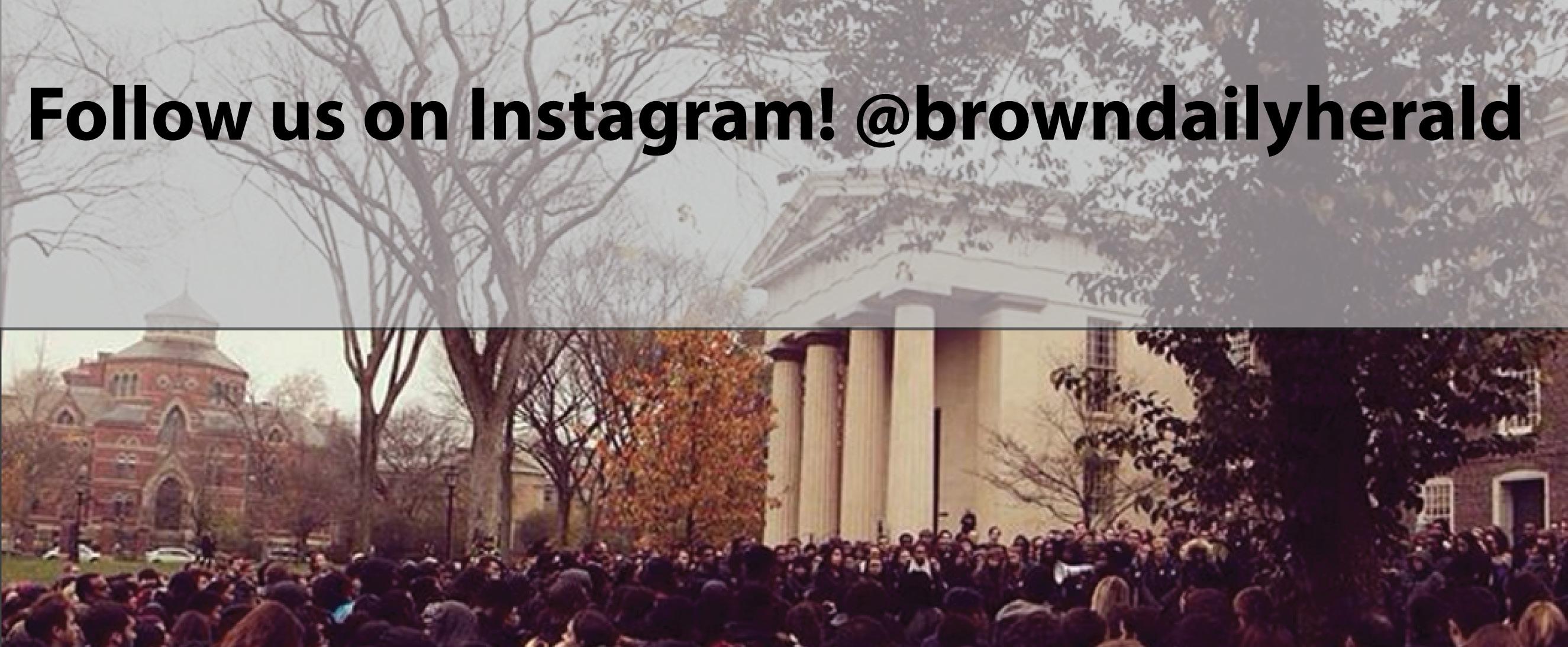 BY NICHOLAS MILLER SENIOR STAFF WRITER
BY NICHOLAS MILLER SENIOR STAFF WRITER
When forward Kojo Dadzie ’24 slotted home a penalty kick in the 63rd minute of Saturday’s game between the men’s soccer team (8-6-3, 0-4-3 Ivy League) and Yale (7-4-5, 2-3-2), it looked as if the Bears might conclude their season with their first win against Ivy League competition.
But a raucous Brown supporter sec tion had barely began celebrating when Yale answered in the 67th minute and netted another in the 88th, delivering a heartbreaking end to Brown’s season on the Bears’ senior night.
“We were in the game for most of it. It’s just a couple moments that hap pened,” Dadzie said. “I wish we could’ve done it for the seniors.”
It is the first time since 1958 that the Bears have failed to win a game in the Ivy League, broadcasters said on ESPN+, despite going 8-1 in non-conference play this season.
“The games in Ivy League are dif ferent,” Head Coach Chase Wileman said. “It’s not necessarily a soccer or tactical thing, it’s a lot about mentality and fight and doing the right things, … and those are the things we need to address.”
With a total of 23 fouls, the game was a scrappy affair, which resulted in an unpolished deadlock in the first half:
Both teams were stuck battling for the ball in the center of the park as scoring chances came exclusively from set piec es. Yale had the majority of possession and the only shot on target in the first 45 minutes, while Brown struggled to connect consecutive passes with its 5-4-1 formation.
But in the second half, Wileman moved to a 5-3-2, a decision that gave the Bears more control on the ball.
“We thought they were going to play one way, and they came out a dif ferent way to start the game. They’re a pretty direct team, and we were strug gling to put pressure on the ball. We switched to two up top so we could get more pressure on the ball,” Wile man said.
In the 63rd minute, wing-back Tan ner Barry ’25 sent a waist-high cross into the middle of the box where it struck the hand of a Yale defender, forc ing the referee to give a penalty kick.
Dadzie stepped up, driving the ball into the side netting while send ing the Yale goalkeeper the wrong way.
But just four minutes later, Yale midfielder Max Rogers sent in a driv en corner kick that was met at the near post by an onrushing and unchallenged Yale defender Jeremy Haddock, who thundered a powerful header past Brown goalkeeper Henrik Weiper ’26.
Ten minutes later, the Bulldogs had a golden opportunity to take the lead on their own penalty kick, grant ed after a Yale attacker’s bicycle kick shot hit the hand of defender Taha Kina ’24.
But on Yale attacker Paolo Carroll’s ensuing spot kick, Weiper dove to his
right and made a sprawling save to keep the game knotted at one.
“We analyze the penalty kicks from our opponent. I knew they shot most of the time across their body,” Weiper said.
Weiper denied Carroll again later in the game, making another diving save on a powerful header.
But as Yale continued to up the at tacking pressure, Weiper was eventually beaten once again. With just three min utes to play, Carroll, on the right wing, sent in a curling cross for forward Eric Lagos, who thudded a header into the side netting past Weiper’s outstretched arm. The score guaranteed the Bulldogs the away victory.
“In the first 20 minutes of the sec ond half, I thought we were playing really well. We get a goal and then after that we stop doing everything that we had been doing in the first 20 minutes, Wileman said. “We kept dropping off, we kept allowing them to get balls in the box,”
“It’s not just this game,” Wileman added. “That’s been a problem this entire season, just in terms of game management and mentality.”
After a heartbreaking conclusion to their college careers, Brown’s seniors were honored in a post-game ceremony.
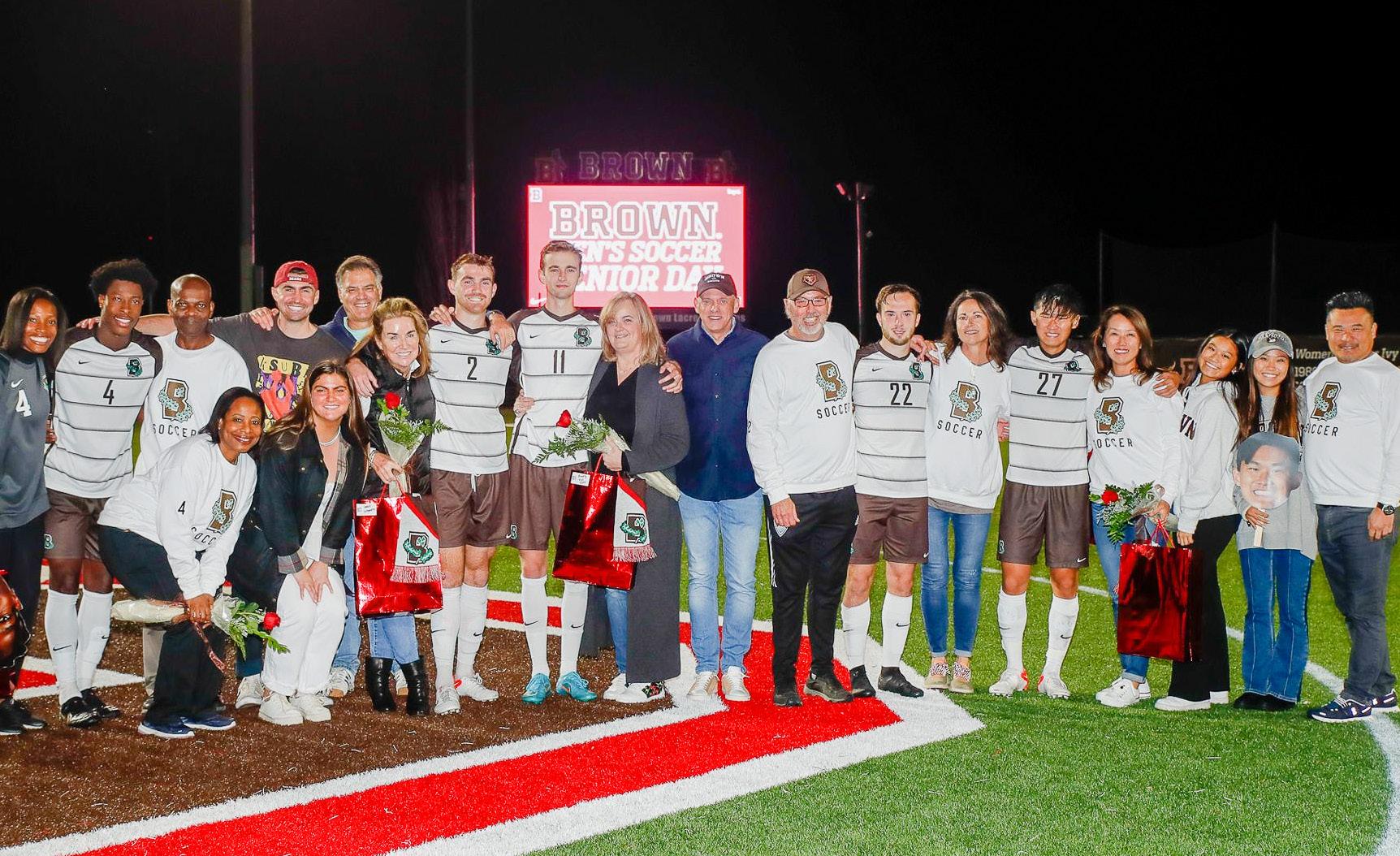
“They are incredible leaders, in credibly nice people, really caring and
loving people,” Weiper said. “I’m really, really, really going to miss them. They graduate now, but this friendship will last forever.”
Finishing his first season as head coach, Wileman will now try to improve upon the program, which has not had a winning record in the Ivy League since 2015.
“We’re not far off, but we’re also not getting them over the line and getting wins,” Wileman said, men tioning that all but two of the team’s losses this season came by just one goal. “It’s going to take a lot of work to start turning those good performances into wins.”
on the offensive. In the first 12 min utes of play, Brown fired off six shots to Rutgers’ zero. But the Scarlet Knights responded quickly, limiting Bruno’s attempts and putting pressure on the Bears’ defense. For the remainder of the 90 minutes, Rutgers recorded 10 shot attempts to Brown’s nine. Over the course of the game as a whole, the Bears outshot the Scarlet Knights 1510, including a slight 4-3 advantage in shots on goal.
Both sides’ offenses had performed well prior to the tournament matchup — Rutgers led the Big Ten in average scoring before Saturday’s game, aver
aging 2.2 goals a game, while Brown averaged three goals per game. But the match was a low-scoring affair all throughout. Neither side was able to get on the board for the game’s first 80 minutes, with goalkeepers Bella Schopp ’26 and Meagan McClelland each contributing three saves for their respective defenses.
In the 81st minute, the Bears fi nally found a way to break through the Scarlet Knights’ defense. Driving down the field, forward Brittany Ra phino ’23 found Seelenfreund, who fired a pass to forward and midfielder Kira Maguire ’24. But Maguire quickly curved a lofted ball back to Seelenfre und, catching McClelland off balance
and allowing Seelenfreund to head the ball into the net for the decisive score. Bruno’s defense held firm for the re maining 10 minutes of the game, and a free-kick save by Schopp in the game’s final minute secured Bruno the victory.
For Allen, the key to the game was “just staying locked in defensively,” she wrote. “We had so many chanc es in the offense, so we knew some thing was coming (and) we just had to remain focused to prevent Rutgers’ chances from connecting as it’d be harder for us to (win) the game once down a goal.”
McNeill emphasized the importance of Seelenfreund’s score to the team’s victory. “We played a great Big Ten team
… today, but I thought we really took it to them and Ava had a great goal there in the end,” she said to Brown Athletics.
But Seelenfreund considered her goal to be part of a broader team effort. “The whole game, we had a lot of op portunities and if one of them hadn’t gone in we would have been really upset today, so that was a team goal,” she said to Brown Athletics.
As the Bears look to advance fur ther in the tournament, they will at tempt to take advantage of more scor ing opportunities early in the game, according to Allen.
“The Rutgers game could’ve gone completely differently had we finished the multiple chances that were appar
ent early on and if we focus on that we can have much more success and a run in the tournament,” Allen wrote. “UC Irvine is going to be a great opponent so if we continue to take care of things defensively and put away our early op portunities,” the team will have a strong chance of advancing to the NCAA Sweet Sixteen.
After taking down Rutgers, Brown will face UC Irvine Friday at 3 p.m. The Anteaters also upset a seeded team on the road, beating the fourth-seeded University of Southern California. The game will be hosted by the University of Alabama, the top seed in Brown’s bracket, and can be streamed live on ESPN+.
Murielle Borst-Tarrant explores Indigeneity, upbringing in performance
One-woman show ‘Tipi Tales from the Stoop’ recounts Brooklyn childhood
 BY NEIL MEHTA SENIOR STAFF WRITER
BY NEIL MEHTA SENIOR STAFF WRITER
In the 1800s, Murielle Borst-Tarrant’s family left Virginia for New York City, where they would remain for four generations. Her family settled in Brooklyn in what she described “a Mafia-run neighborhood,” where her family were the only Native Americans on the block.
Borst-Tarrant shared personal vi gnettes from this upbringing in her one-woman show, “Tipi Tales from the Stoop,” held Friday at the Gra noff Center for the Creative Arts. The show, which explored both humorous family moments and the insecurities she faced growing up, was directed by Assistant Professor of Theatre Arts and Performance Studies Sarah dAngelo.
Borst-Tarrant maintained a hu morous tone for most of the show, bringing audience members through scenes from her childhood: family gatherings, vacations and conflicts. Her exaggerated imitations of family members — her grandmother, mother and cousins — elicited laughter from the audience.
Borst-Tarrant described her dayto-day life in Brooklyn throughout the performance, which included sprinting to her freezer to stay cool in the sum mers, dancing to music on the tele vision and running to her apartment for dinnertime, which her family held two hours after the white families on her block.
A member of the Kuna and Rap pahannock nations, Borst-Tarrant interspaced her lighthearted mono logue with intimate descriptions of the challenges she faced growing up because of her identity. She described a “sadness and rage” of “never quite fitting in, never quite being good enough, never being the right color, always trying to get a small piece of the American dream … and not quite
making it.” Visiting her childhood home often elicited similar feelings, she shared.
The show, which dAngelo said is still being developed, was followed by a brief talkback with Borst-Tar rant and dAngelo, moderated by Avery Willis Hoffman, artistic director of the Brown Arts Institute. Audience members were encouraged to provide feedback.
The latest version of the perfor
mance included new set pieces, as well as background music and visuals ap pearing on three large screens behind Borst-Tarrant during the performance, according to dAngelo.
Addressing the audience, dAn gelo noted her enthusiasm for the continuing development of the show, a process that she considers her “favorite part of theater because it really gives you a sense of col laboration.”
The ongoing development of the performance means that audience members will “never see (the show) again like this,” dAngelo noted.
Attendees praised Borst-Tarrant for her storytelling ability and up beat tone.
Lori Hazard, who attended the show, said the performance was “great” and brought back memories of her Native American family who also lived in Brooklyn. “It reminded
me of my cousin,” Hazard said. Audience member Sherenté Har ris ’23 described the show as “fab ulous.”
“I love seeing Indigenous people from this region being represented, not only telling our traditional stories, but (also) our stories of today,” Harris said. “I loved how this family history was interwoven into (her) larger nar rative, and I love that it incorporated so much humor.”
TODAY’S EVENTS
Student Q&A with Pronita Gupta 10:00 a.m. Watson Institute
Storyweaving Workshops with Murielle Borst-Tarrant 5:30 p.m.
Granoff Center for the Creative Arts
TOMORROW’S EVENTS
School of Public Health Blood Drive 10:00 a.m. 121 South Main St.
Ins and Outs of Getting Published at American Anthropologist 12:00 p.m. 128 Hope St., 212
IAPA Funky Fall Fun 3:30 p.m. 280 Brook St.
Chamber Music Masterclass with Ani Kavafian 7:00 p.m.
Grant Recital Hall
Is Russia an Asset for China? 10:00 a.m. - 11:00 a.m. Online
Introducing “In the Wake of George Floyd” 2:00 p.m. - 3:00 p.m. Rockefeller Library
‘Hair’ brings story of community, freedom of expression to Brown
Rock musical talks about Vietnam protests, drug use in 1960s New York City
BY SOFIA BARNETT SENIOR STAFF WRITEROver the weekend, Ensemble’s produc tion of Gerome Ragni and James Rado’s “Hair: The American Tribal Love-Rock Musical” took Alumnae Hall by storm, with four performances spread across Friday, Saturday and Sunday.

The show began with cast members stumbling down the aisles, acting as if on hallucinogens and handing au dience members fake pills (TicTacs) and marijuana (pieces of paper with “weed” written on them) as they headed towards the stage. The opening number “Aquarius” then set the scene with its upbeat musing on astrology, spirituality and love.
“Hair” is unconventional down to its composition. The first mainstream rock musical, “Hair” is remembered for its abandonment of classic genre conven tions. It tells the story of the “tribe,” a diverse group of psychedelic-enthused, long-haired, politically-engaged “hip pies” who live in New York City. They spend the greater deal of their time pro testing conscription into the Vietnam War and experimenting with drugs. The story focuses on freedom, expression and the importance of uniting under common values and experiences.
For director Sofia Matos ’24, the show’s emphasis on community pushed past the confines of the script, trickling into production dynamics behind the scenes.
“I picked this show because I think at the very core of it is a strong theme of community,” Matos said. “It just res onates really well today throughout the world, the Brown community and the community we’ve created working on this show, too. My goal was to create a community and I think that has really
SOUL FROM PAGE 1
immersed in the world of this festival — a technique that Questlove described as “my own personal visual aquarium.”
One night, in the early hours of the morning, he was getting back from a DJ set and saw footage of a Stevie Wonder drum solo while half asleep in his bed. As soon as he saw it, he instinctively knew it had to be the opening scene of the film.
It was moments like this — uncov ering never-before-seen footage — that inspired Questlove to pursue the proj ect, despite having never directed a film before.
“I was paranoid about an imagined doom reception,” Questlove said. But later on, “I realized this was history we were uncovering, and that was enough to take the brave steps to make a film.”
The Harlem Cultural Festival was almost completely forgotten, apart from attendees’ memories, so bringing this event to the forefront of the cultural canon was import ant to Questlove. He asked Patel in the early development stages of the film what it would have been like if they both knew about this event — a “Black Woodstock” — when they were kids. Questlove added that he wanted
come through.”
Matos expressed her gratitude to each cast member’s dedication, not ing that the collaborative nature of the production helped her vision truly come to life.
“It’s an amazing cast and I’ve been so lucky to work with them. It’s very healthy and collaborative,” she said. “I didn’t want things to be organized where I was at the top and then it was everybody else. Everybody has an im portant part in this and I think theater is best done when everybody is working together in that way.”
For Cassie Travis ’25, one of the show’s executive producers, Matos’s prioritization of community really shone through.
“Getting to executive produce ‘Hair’ gave me the opportunity to see an in
to make a film about Black joy, not trauma.
The film takes moments to relay this message on a scale beyond the scope of the festival. There’s a scene where Rev erend Jesse Jackson, who was in atten dance at the Harlem Cultural Festival, talks about being present the day of Martin Luther King Jr.’s assassination.
Instead of discussing the tragedy, he made sure to mention that on that day they were all being jovial and having a pillow fight. In response to this anec dote, Questlove said, “Oftentimes when stories are told and revisionism kicks in, it makes us believe it was some sort of dark day.”
When responding to a question about the pacing of the film, Questlove cited the music of Public Enemy as a chief inspiration. He described their music as a Jackson Pollock painting, frequently using “30-something sound bites” in their music. Questlove didn’t want this to be just a concert movie — instead, he intentionally layered mul tiple elements on top of the concert to make it more impactful.
Patel said that film editor Josh Pearson’s background in music helped him maintain the film’s pace. “He’s a musician, so he understands rhythm.” When Questlove requested to “Public
credibly talented cast collaborate with a hardworking production team,” they said. “They put on such a beautiful and powerful show that is so relevant to the age we live in.”
Audience member Jacob Gelman ’25 said that the show “felt like a more exciting recap (of) things we read in the news daily.”
“The way the show interacts with protesting the (government) and queer ness felt really familiar,” Gelman said.
“I think overall it was a light-hearted (musical) that deals with serious topics in a digestible way.”
With the show lasting just over two hours, audience member Michelle Ding ’25 noted the cast’s stamina as they performed taxing numbers successively.
“I’m so impressed that they were able to keep going with both singing
Enemy this movie,” Pearson knew what Questlove meant, Patel said.
When putting together the film, Questlove was concerned about grab bing the attention of a younger audi ence. His initial idea was to interview contemporary artists such as Drake or Kendrick Lamar to increase the movie’s appeal to younger viewers, but that all changed in 2020. Quest love cited COVID-19 pandemic, the death of George Floyd and the loss of his own friends as moments that shifted his perspective on what the film should be.
“Summer of 2020, we were practical ly living in the same conditions as back then, and that was the connection,” Questlove said.
While Patel is grateful for all the awards the film has received, he said garnering acclaim was not the reason they made the movie. “All we ever want ed was (for) people to love the movie. So all the awards are incredible. They’ve opened up a lot of doors for us,” Patel said. “They obviously acknowledge a lot of the work that you put in, a lot of choices you make in making a film, but more than that, I just love that people loved the movie.”
The music really guided the making of the film, Patel said. “For me, music
and dancing for so long,” she said.
“The range of the songs is crazy and they have to dance while doing all of it too. It’s amazing — they were just going at it.”
With flashing lights and bright flo ral-patterned outfits, the cast danced, crawled, strutted and skipped across the stage. Most scenes incorporated the majority of the cast, but there were also solos that highlighted the individual talents of cast members.
Audience member Elvin Choi ’25, who originally came to support a friend in the cast, ended up enjoying solo per formances by several cast members throughout the show.
“There are a lot of really incredible singers and I’ve been really impressed by that,” Choi said.
In the closing song “The Flesh Fail
was my gateway into everything. I used to go buy records and CDs in stores, and on the train back look at the liner notes and look at the photos and listen to the music and really just dive in,” Patel said. “I think that’s how I learned about literature and design and photography and politics.”
Patel also emphasized the ability of music to tell stories. “Music is made by people who live in communities that are made up of families that are made up of individuals. So there’s always a way to tell broader cultural stories through music, and I think that’s what I enjoy,” he said.
Patel added that in making the film they didn’t have any specific cinematic influences to go off due to the unique structure of the film. “We weren’t watching anything else — we just wanted to make this film,” Patel said. “I think when you’re in the middle of making something, it’s hard to really watch anything else because all you’re thinking about is your thing.”
After the small discussion, there was a larger talk held for a general au dience that was moderated by Tricia Rose MA’87 PhD’93, chancellor’s pro fessor of Africana Studies and director of the Center for the Study of Race and Ethnicity in America.
ures (Let the Sun Shine In),” cast mem bers raised their hands to the ceiling and swayed next to one another before taking a bow. After a standing ovation from the crowd, the cast welcomed Ma tos onto the stage to dance with them.
In her director’s note, Matos wrote that “this has been one of the most fulfilling shows I’ve ever worked on, and I’ve discovered in our cast, crew and creative (team) a warm and welcoming community like no other.”
“More than anything else, I want ed this show to be about creating a community, about finding the people who will be there to support you in the face of anything at all,” she said. “I wanted us to work together to create something bigger and better than all of us, which I can with absolute certainty say we did.”
At the talk, Patel spoke about the movie’s main goal. “Our first mission with the film was, if we do this film correctly, you’ll never be able to talk about the summer of ’69 again with out talking about the Harlem Cultural Festival,” Patel said. “More importantly, knowing that Black history is American history is a thing that wasn’t available in this instance.”
The discussion then moved to the role of technology in histori cal preservation and storytelling. Questlove said he used Twitter to find people who attended the festival so he could interview them for the film. This critical insight helped with crafting the narrative along with its intended goals.
Originally the film was going to be titled “Black Woodstock,” but that title was widely shut down from those who were in attendance. This was because they took issue with the idea that the story of the festival had to be told in relation to Woodstock, as opposed to it standing on its own.
Patel concluded by summarizing the role of technology in crafting nar ratives. “Technology has allowed people to tell their stories easier now than ever before in history, but the stories still need to be told.”
Football loses in overtime to Columbia on Senior Day
BY LINUS LAWRENCE SENIOR STAFF WRITER
The football team (3-6, 1-5 Ivy League) lost to Columbia (5-4, 2-4) 31-24 in its final home game of the season Satur day afternoon at Brown Stadium after fighting back from a 21-point deficit to send the game to overtime.

“Any time you go to overtime, one of the two teams is going to be tremendous ly disappointed. Unfortunately, it was us today,” Head Coach James Perry ’00 said. “But it certainly is not (because of) a lack of effort or a lack of preparation. (The players) prepare well, they practice hard.”
After a scoreless first quarter in the Bears’ Senior Day matchup, the Lions’ offense struck with a 30-yard touch down pass on the first play of the second quarter. In the next six minutes, Colum bia got two more long touchdowns on a 60-yard rush and an 80-yard pass to jump out to a 21-0 lead.

Bruno responded with two touch downs of their own — one at the end of the half and another at the start of the third quarter — making it a one-pos session game. Both touchdowns were scored by running back and co-captain Allen Smith ’22.5. Smith totaled 100 rushing yards against a Columbia rush ing defense, which is ranked third in the Football Championship Subdivision in yards allowed per game. Smith set a personal season-high for the second straight game.
“Allen’s a captain in every sense of the word,” Perry said. “He is a com plete back. He’s been a complete back all year.”
Despite Columbia scoring a 41yard field goal at the start of the fourth quarter, bringing the score to 24-14, the Bears still managed to pull off an
exciting comeback with a touchdown reception by Jordan DeLucia ’25 and a field goal scored with four seconds left in regulation.
With first-string quarterback Jake Willcox ’24 still sidelined after an injury two weeks ago during a game against Penn, Aidan Gilman ’23 — who was named Ivy Offensive Player of the Week for his performance that same game — once again started for Bruno. Will Jarvis ’25 also saw playing time for the second straight week.
“They’ve done a great job,” Smith said. “It’s really (a) next man up men tality that they’ve had. They’ve been pushing each other and have been step ping up great.”
The Bears struggled keeping the ball early on, recording five turnovers on four interceptions and a fumble by the end of the game. “I’ll look very hard at things that we can do to take care of the ball better,” Perry said. “That’s a point of emphasis for us … and we didn’t do it.”
But in the fourth quarter, the of fense locked in on back-to-back scoring drives with Gilman going 12-for-14. The Bears defense also had a strong second half, allowing just two first downs in the third quarter and four in the fourth quarter. The lockdown defense follows a lackluster performance against Yale last weekend, in which the Bears defense allowed the most points in program history.
“I think they were hungry to play well,” Perry said. “They especially came out of that locker room (in the second half) and just were not yielding. … They were hitting and running straight to the end.”
The game reflected recurring pat terns for the Bears this season, who have been outscored by opponents 125-55 in the second quarter and have outscored opponents 95-41 in the fourth quarter. This trend began with the team’s dramatic double-overtime comeback victory against Bryant Uni
versity on opening day, when the team scored 21 points in the fourth quarter.
“We got grit, man,” Smith said. “We worked so hard during the week. … When we’re tired, we just keep going, and I think that really expresses itself out on the field.”
In overtime, Columbia recorded a four-yard touchdown pass on their first drive starting on the Brown 25-yard line. This time, the Bears were unable to respond, and a fourth down incomplete pass intended for wide receiver Wes Rockett ’23 sealed the Lions’ victory.
Despite the loss, the game featured memorable performances from sev eral seniors in addition to Smith and Gilman. Players in their final season on the team were celebrated with spe cial introductions in their last home appearance.
Defensive back Cooper DeVeau ’23 broke up three passes, ascending atop the Ivy League leaderboard for the number of passes defended each
game this season and moving into the top 10 in the FCS. Rockett led the team with seven catches for 71 yards, co-cap tain Junior Gafa ’23 set a career-high with nine tackles and Harrison Ochs ’23 recorded an exciting interception, leaping to catch a falling deflected pass.
There were “a lot of highs” today, Gafa said. It was “a tough one pulling out, but we got to keep our heads up.”
“I’m definitely thanking God for this day,” said Smith. For the “opportunity to go to Brown, play football here,” and have “family and friends out here” on Senior Day, he said. “It’s a blessing.”
“Everything that is a Brown football player is what this senior class is all about,” Perry said. “We are much better because of it and they want like heck to win these games.”
The Bears will finish their season Saturday on the road against Dartmouth. The game will be broadcast at 1:30 p.m. on NESN and available to stream on ESPN+.
Submissions: The Brown Daily Herald publishes submissions in the form of op-eds and letters to the editor. Op-eds are typically between 750 and 1000 words, though we will consider submissions between 500 and 1200 words. Letters to the editor should be around 250 words. While letters to the editor respond to an article or column that has appeared in The Herald, op-eds usually prompt new discussions on campus or frame new arguments about current discourse.
All submissions to The Herald cannot have been previously published elsewhere (in print or online — including personal blogs and social media), and they must be exclusive to The Herald.
Submissions must include no more than two individual authors. If there are more than two original authors, The Herald can acknowledge the authors in a statement at the end of the letter or oped, but the byline can only include up to two names. The Herald will not publish submissions authored by groups. The Herald does not publish anonymous submissions. If you feel your circumstances prevent you from submitting an op-ed or letter with your name, please email herald@ browndailyherald.com to explain your situation.
You can submit op-eds to opinions@browndailyherald.com and letters to letters@browndailyherald. com. When you email your submission, please include (1) your full name, (2) an evening or mobile phone number in case your submission is chosen for publication and (3) any affiliation with Brown University or any institution or organization relevant to the content of your submission.
Please send in
The Brown Daily Herald, Inc. is a financially independent, nonprofit media organization bringing you The Brown Daily Herald and Post- Magazine. The Brown Daily Herald has served the Brown University community daily since 1891. It is published Monday through Friday during the academic year, excluding vacations, once during Commencement and once during Orientation by The Brown Daily Herald, Inc. Single copy free for each member of the community. Subscription prices: $200 one year daily, $100 one semester daily.
SPORTS Bears overcome 21-point deficit before failing to score in extra periodCOURTESY OF DAVID SILVERMAN PHOTOGRAPHY / BROWN ATHLETICS Running back and co-captain Allen Smith ’22.5 scored touchdowns in the second and third quarters, totaling 100 rushing yards and setting a personal season-high for the second straight game. But Smith’s efforts were not enough to guarantee the Bears a victory.
LGBTQ students.
“It’s important to note that this home-like feel was intentional from the start,” they said. “So many LGBTQ students lack access to a place on col lege campuses, or even in their own cities and towns, that feels like a home to them.”
O’Neill extended a warm thanks to everyone involved in the construction of Stonewall House, emphasizing the importance of collaboration on the project.
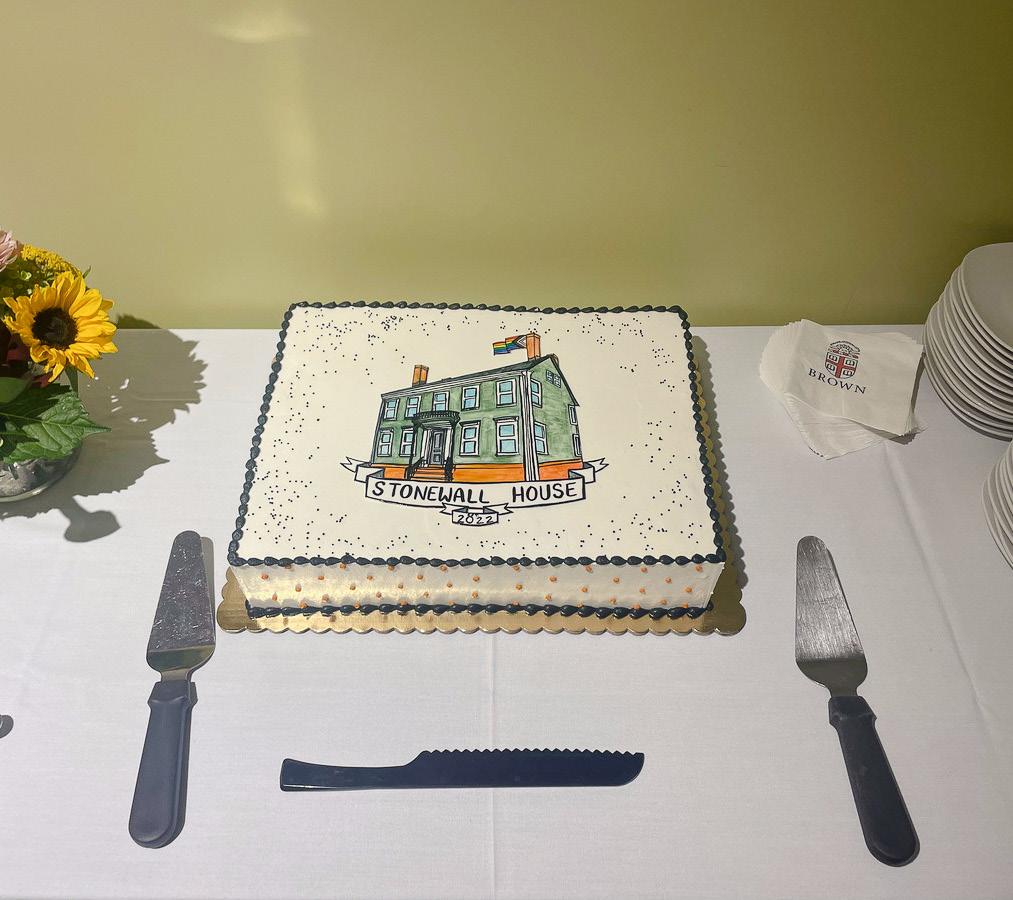
“Everyone from the Gledhills, to architects, to construction, to Facili ties Management have been wonderful about incorporating student feedback in the design and renovation process,” they said. “And I can tell you now that nothing can beat the looks of absolute wonder and awe on the students’ faces when they see the space for the first time.”
“It is so incredibly heartwarming to see some of these faces when they see their dreams come to life,” O’Neill said.
Alaina Cherry ’24, an LGBTQ Center student staffer, said that the new space poses a great opportunity for students to convene together and feel welcomed on campus.
“It’s so exciting to have a space to host events and a space for people to study while also meeting new people,” she said. “You can come to work and if there’s people you don’t know, you can come say hi and meet them. It’s not like a library but a casual, welcoming space.”
Nia Sampson ’25, another LGBTQ Center student staffer, added that the recognition of a stand-alone building will be impactful too.
“It’s really important that we finally have a larger space,” she said. “For at least 18 years, we’ve had a small floor on the campus center that wasn’t ad vertised. Now, we have this big opening and this historical moment.”
Estes also spoke at the event on the significance of the LGBTQ Center having its own building after congrat ulating the Gledhills and community members on their new space.
“I’m excited to be here in this beau tiful new space today,” Estes said, add ing that he was excited that his office and the LGBTQ Center are next door
our shared goals of accessibility, equity and inclusion.”

“I am a big believer that visible, geo graphical, structural messages matter a lot,” he said.
Estes explained that upon his arriv al in 2016, “strengthening support for identity centers” was one of his major goals.
“Today is a day when dreams actual ly come true,” he said. “How exciting it is to be able to continue with advancing
Paxson said that she is excited for the opportunities Stonewall House pro vides for collaboration.
She noted that through the new building, the center has already be gun building connections with other student-facing groups on campus, in cluding the Brown Center for Students of Color, the Undocumented, First-Gen eration and Low-Income Center, Sarah Doyle Center for Women and Gender and the athletics department.
to this place and build a really strong community,” Paxson said.
Katie Gledhill spoke after Paxson on the vision, planning and dreaming that went into the development of Stonewall House, including how they chose its name.
“It’s been such an amazingly won derful privilege to be a part of bringing this to life,” she said. “And one of the perks of that has been the opportunity to name it. … We affirmatively decided
compass everyone who has come before us and everyone who will carry the flag on after us,” Katie Gledhill said. “So we thought it was the perfect choice. It’s really where the people who came before us really started to stand up for the rights of the LGBTQ community.”
Kelly Garrett, previous director of the LGBTQ Center, said she was “thrilled to see this long-term dream” come to fruition.
“Even though I’ll miss Brown a lot, I’m excited for where the center is right now and I’ve left it in great hands. (Stonewall House) will encourage me
them, said Kevin Simon, director of outreach and communications for Mathewson Street. RIPTA had vis ited Mathewson Street to distribute no-fare bus passes prior to Sunday, but only managed to enroll 12 people who meet the existing criteria, UP RISE RI previously reported.
“The current RIPTA program for low-income bus ridership was incred ibly restrictive, not just for unhoused people, but really for any poor person,” said Patrick Crowley, a member of the RIPTA board of directors, who proposed the pilot program to the RIPTA board. “The requirements were onerous, and that’s why the program, in my opinion, wasn’t used enough.”
Organizers said that the bus passes would help unhoused and low-income riders go to work, doctor’s visits, shel ters and even events like the church’s free breakfasts. “These are pretty basic human things. So, I think the impact is powerful,” Clinker said.
On Sunday, the demand for the new passes was evident. RIPTA allotted 50 free bus passes to Mathewson Street church, and distributed the rest to a variety of other similar organizations across the state, Simon said.
Not long after 8 a.m., all 50 passes at Mathewson Street were distributed.
“It’s hard to not pay attention when you’re sitting next to someone on the bus. It’s hard to not hear their stories, to share their experiences,” Crowley said to the crowd, speaking after Clinker. “Rhode Island is a better place to live when we all can see each other.”
Those who managed to get passes emphasized the importance of the free dom of movement they would provide.

“It’s heaven,” said Mark, a local, when asked about the impact of receiv ing the pass. He said that while he has a place to live, money has recently been tight. “Hopefully six months doesn’t go by that quick,” he said.
Despite the recent victories, activ
ists at Mathewson Street Church still caution that there is much to be done.
Pamela Poniatowksi, one of the chair’s of Rhode Island’s Poor People’s Cam paign and an organizer for the Housing Justice Organizing Committee, said that while the pilot is a great step forward, “we need it for more people, that’s just obvious.”
Simon noted that the organizing committee had originally asked RIPTA to allot passes specifically for unhoused people, instead rather than a broader low-income group.
“RIPTA made it happen in less than two weeks, so credit to their staff, but it’s not entirely what we wanted,” Si mon said. “There’s gonna be … a lot of folks who are going to really benefit from this program, but there’s gonna be an incredible amount of folks who won’t be able to utilize this.”
“600 isn’t gonna get it done,” he added.
According to Crowley, RIPTA ex panded eligibility for the passes in part because it was difficult to determine who qualified as “unhoused,” a con
cern the RIPTA board of directors heard about during testimony. Rather than coming up with “a perfect definition,” Crowley said that RIPTA decided an income threshold would target those “in need of support” without having to apply such a definition.
“By directing the passes to the agen cies that specifically work with the un housed, the thought process was (that) most of these passes are going to get to people (who), by most other general common sense definitions, would be considered homeless or unhoused,” said Crowley. He added that if additional passes were needed further down the line, he would work with the board to make sure people got them.
But Clinker said that RIPTA missed “key agencies,” such as House of Hope and Amos House in its distribution plan, limiting its impact. “It could’ve been more powerful,” he said.
Choosing which organizations to distribute to was determined by “exist ing relationships” that RIPTA had with agencies, Crowley said. He noted that transitioning the pilot program to a
formal policy will offer RIPTA a chance to improve and change the program.
“That gives us the opportunity to say, ‘Okay, what could we have done a little bit better, and who else could be involved,’ so that going forward, we’ll have as many voices at the table as possible,” he said.
The No-Fare Bus Pass pilot is part of a series of recently enacted transit equity programs in Rhode Island related to transit equity. RIPTA also recently began a year-long free fare pilot pro gram for the R-line, the most popular bus-line in the state, connecting Provi dence and Pawtucket. Similarly, RIPTA also began a “Ride Free Central Falls” pilot earlier this year, “which allows passengers to board for free in Central Falls when using a Wave smart card or mobile app,” according to a RIPTA press release.
Crowley said that he hopes that the R-line project will help “demonstrate that if the whole system is free, then it’ll be better used.”
“We are collectively starting to recognize and talk about transit as an
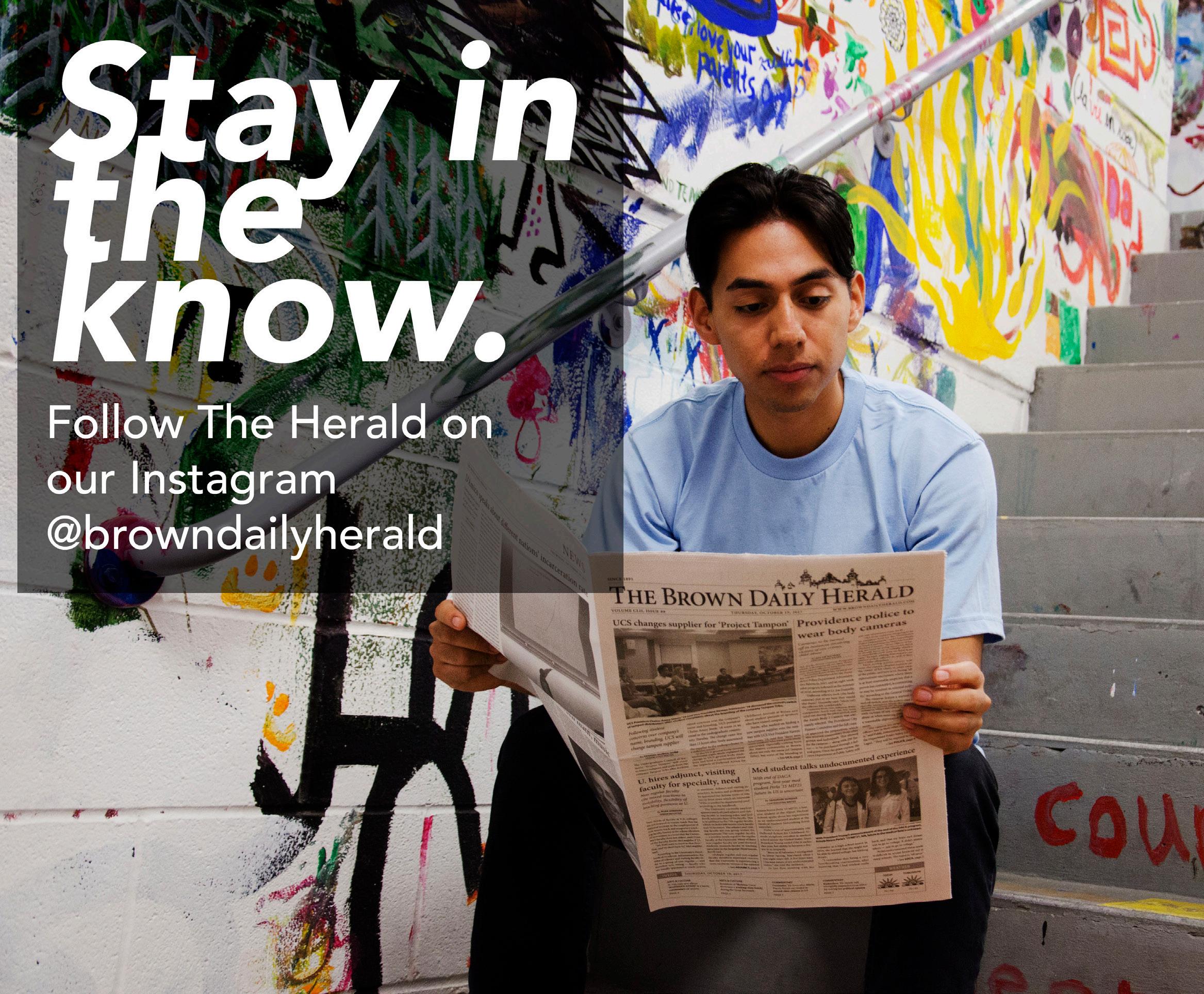
aspect of equity,” said Rhode Island State Senator Meghan Kallman ’‘16 (D - Pawtucket, Providence).
Kallman sponsored legislation which allotted state funding that made the R-line program possible. She originally proposed making the entire system free, but due to funding issues settled on doing a pilot program first due to funding issues.
“The state budget is a reflection of the things that we prioritize,” Kallman said “Prioritizing transit is one of the things that we need to be doing more of in a very significant and dedicated way.”
The goal of the free R-line pilot is to see “how it’s working and for who,” Kallman said, which includes looking at if ridership numbers increase. Kallman also explained that equitable transit provides benefits for both riders and the environment, noting that public trans portation can help reduce emissions.

“We have to change our expec tations, expect more,” said Kallman. “We’re a tiny little state, but we can have a bus system that is clean, effi cient, timely, convenient (and) free.”
Continuing with our series on sex ual politics, this week we take a look at the scope of sexual assault advocacy on campus. We speak with Rhea Rasquinha, senior staff writer, about her reporting on this and hear from University officials and members of student organi zations dedicated to this issue.
Subscribe to the podcast on Spo tify or Apple Podcasts or listen via the RSS feed. Send tips and feedback for the next episode to herald@browndailyherald.com.
The Bruno Brief is produced in partnership with WBRU.

